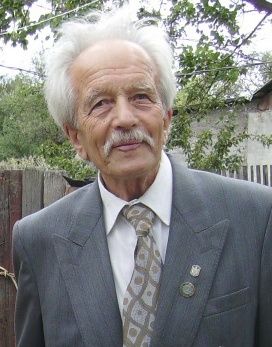Ostarbeiter, political prisoner, Prosvita activist, publicist.
Born into the peasant family of Yurko and Nastia. He completed three grades in a state village school with “Ruthenian” (i.e., Ukrainian) as the language of instruction, and from the fourth grade, he was a student at Stryi’s “Ridna Shkola” (Native School). In 1939, he began studying at School No. 10 in Stryi. During the German occupation, he was transferred to the 5th grade of the gymnasium, but he only studied there for six months.
The family became utterly impoverished: there was not a crumb of bread in the house. In February 1942, along with his father, he was forced to “voluntarily” leave for work in Germany. He worked for a Bauer (farmer) in the village of Ganserin in Pomerania, while his father worked in the neighboring village of Kepitz.
Soon, H. established contact with Ukrainian organizations, primarily the “Ukrainian National Alliance” and the “Ukrainian Community.” He read many Ukrainian books published both in Ukraine and abroad. He later wrote in his autobiography: “I invested all my earnings in newspapers and books, which I distributed among Ukrainian Ostarbeiters.” The most important were the newspapers “Ukrayinsky Visnyk” (Ukrainian Herald), “Ukrayinska Diysnist” (Ukrainian Reality) (Berlin), “Nastup” (Offensive) (Prague), and the journal “Proboyem” (Breakthrough) (Prague).
In April 1945, he was “liberated” by Red Army troops and arrested by the “Smersh” counterintelligence of the 3rd Shock Army. He was sentenced by a Military Tribunal under Article 58-1a of the Criminal Code of the RSFSR to 10 years of imprisonment and 5 years of disenfranchisement for “anti-Soviet activity” (distributing Ukrainian press and books among Ukrainian Ostarbeiters) and for his connections with the OUN.
He served his sentence in Siblag (Antibes settlement) and Steplag (Kengir, Dzhezkazgan), where later, in May–June 1954, a strike began demanding the abolition of the degrading numbered patches (H. had the number SVV-667 in Kengir), a reduction in production quotas, improved medical care, and a review of cases. The strike grew into an uprising, which was crushed by tanks. At that time, H. was in the settlement of Antibes.
He was released in 1955 upon completion of his sentence. He went to the Donetsk region, where his parents had already moved. He worked as a laborer, first at the Ocheretyne brick factory and then at the Avdiivka coke and chemical plant. In 1968, he graduated from an evening secondary school, took German language courses (1969), and then graduated from the Ukrainian department of the Faculty of Philology at Donetsk State University (1974). From 1972 until his retirement, he worked as a teacher of German, Ukrainian language, and literature at the Ocheretyne Secondary School.
From the time of his release, he was under close secret KGB surveillance, and from 1972, under open surveillance. He was summoned for interrogations in connection with the arrests of dissidents. In particular, in February 1981, they searched his home for, but did not find, the work by Oleksa TYKHY, “Language. The People.” Searches, threats, and blackmail of his family continued until 1990.
With the beginning of perestroika, he actively worked for the Ukrainian national revival. He was one of the organizers of the Taras Shevchenko Society of the Ukrainian Language in the Donetsk region and the All-Ukrainian Society of Political Prisoners and the Repressed (VTPViR). He was a co-founder of the UHS in the Donetsk region (1989), a member of the URP (1990), and head of the local branch and a member of the senate of the OUN(m). On January 22, 1989, Unification Day, he participated in a rally under blue-and-yellow flags in Donetsk.
He was a member of the editorial board of the journal “Porohy” (Sicheslav, 1998-90). In 1990, two issues (in typescript) of the samvydav artistic and journalistic almanac “Kayala,” which H. founded and edited, were published, but they had to cease publication due to a lack of funds.
He was the author of hundreds of publications on the history of Ukraine, particularly of Sloboda Ukraine and the Donetsk region, and on figures of Ukrainian culture.
He was buried on September 24, 2011, in the village of Ocheretyne.
Bibliography:
1.
The ‘Quote Book’ of Oleksa Tykhyi // He Who Was Not Broken in Spirit. Materials of the scientific conference dedicated to the memory of Oleksa Tykhyi. – All-Ukrainian Society “Prosvita” named after T. Shevchenko. Druzhkivka city organization. – Druzhkivka, 1994. – pp. 21-23.; Ibid: journal “Zona,” No. 7, 1994. – pp. 215–217.
My Encounter with Oleksa [Tykhyi] // Skhidny Chasopys, No. 24. – 1997.
Dzhezkazgan // Ukrayinske Slovo, 1998. – No. 29; From Berlin to Antibes. – 1998, No. 46; Antibes. – 1999. – No. 4.; Kengir. – 1999. – No. 33.
From Berlin to Antibes // Molod Ukrayiny, 1999. – No. 40; Antibes. – No. 41; Kengir and Dzhezkazgan. – No. 42.
Selected Works: Articles, Memoirs, Poems. – Kyiv: Vyd-vo im. Oleny Telihy, 2005. – 115 pp.
Autobiography. September 2, 2001.
2.
Vakhtang Kipiani. Ukrainians Against Urkagans. – Ukraina Moloda, No. 28. – 2005. – February 12.
Biletskyi V.S. The History of the Donetsk Regional Organization of the People’s Movement of Ukraine (1989-1991). Donetsk: Ukr. kulturoloh. tsentr, Donetske viddilennia NTSh, 2009. – 172 pp.
International Biographical Dictionary of Dissidents in Central and Eastern Europe and the Former Soviet Union. Vol. 1. Ukraine. Part 1. – Kharkiv: Kharkiv Human Rights Protection Group; “Prava Liudyny.” – 2006. – pp. 1–516; Part 2. – pp. 517–1020; Part III. – 2011. – pp. 1021-1380; Homza, Ya., pp. 1094–1096.
The Resistance Movement in Ukraine: 1960–1990. An Encyclopedic Guide / Foreword by Osyp Zinkevych, Oles Obertas. – Kyiv: Smoloskyp, 2010. – pp. 145–146; 2nd ed., 2012. – pp. 161-162.
Vasyl Ovsiienko, Kharkiv Human Rights Protection Group. Last read on May 24, 2016.
Characters 4,429. Homza

HOMZA YAROSLAV YURIYOVYCH